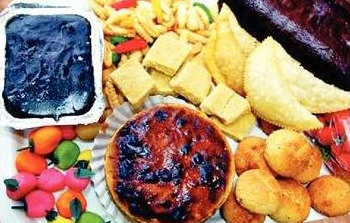
Selma Carvalho
The days lose light, the nights are dense and dreadfully cold. In the mornings, a milky fog lifts to spired skies and hard frost pales the grass. This is London in winter. Despite the predictability of its weather, the endless days of rain and fog, London is a city of shifting ground; everything is in a state of flux, constantly morphing into something new. Change is what the city accepts as a normal way of life, turning its gaze on new ethnicities and cultures, and claiming them into its fold. Quite possibly, Goans arriving with Portuguese passports have been one of its most substantial inclusion in the last decade.
When I arrived in London nearly 13 years ago, and took up residence on its periphery, an edgeland transitioning from a semi-rural village to urban city, there were but a handful of Asians living here. That first Christmas, my family celebrated mass at St Catherine’s church, its altar beautifully wreathed in holly and mistletoe; as the organ rang its notes and the choir sang, ‘Joy to the world’, we realised we were the only Asian family there. Today, this space of joyful congregation is inhabited by Goans on almost every pew, as faithful in devotion with heads bent, as in a call to service, offering their assistance to the parish priest. As I tick off the days to Christmas from my chocolate Advent calendar, it occurs to me that this year, much more of my Christmas will be shaped by Goa.
Some days ago, I set about mailing my Christmas packages, of which there are far too many, this unsettling year of Covid-19 lockdowns when social gatherings are prohibited. I heard the distinct strains of Konkani being spoken at the local post-office. It turns out the post-office branch is run by Goans. This came as quite a surprise, as Goans rarely run post-offices in the UK. Most of the post-offices are run by Sindhis, Punjabis and Gujaratis. It was common in colonial East Africa for Asians to be employed as post-masters in remote bomas, outposts; and they carried on with these traditional occupations of owning small shops or franchising post-office branches, after decolonisation brought them to the UK. I could tell, the family had newly arrived from Goa, and I admired their courage in taking over a business whose margins are slim and failure rate quite high. But the new arrivals are astonishingly adaptable in the UK, working as beauticians, security guards, and of course in restaurants and supermarkets. Everywhere I go, I spot someone wearing a nametag of Xavier or Joaquim, and recognise them as fellow Goans.
The most likely business Goans undertake is catering. In East Africa too, Goans ran mess services mostly for single men who lived as boarders, or they ran bakeries and confectionery shops. But in the Arabian Gulf, Canada, US and UK it was unlikely you’d find Goan catering businesses. Times have changed. The availability of spices, such as Kashmiri chillies, turmeric, etc., locally, the ability to connect via social media with potential customers, easy distribution using Amazon and other parcel services, and equal ease in receiving payment through third-party agents such as PayPal, has meant home delivery has burgeoned. Hardly a week goes by, when I don’t receive an email or a flyer slipped through my door, promising me home-delivery of Goan xacuti, sorpatel, fish curry, literally any Goan delicacy my mouth craves for. No longer do I have to wait for my annual trip back to Goa, to enjoy Goan sausages. There is a family, quite near to where I live, that makes the most authentic tasting cured and smoked Goan sausages, both the large variety and the smaller type which my grandmother would call lingus. Choritz stuffed pastries, beef croquettes, and a variety of snacks are also produced by them, which could quite easily rival that of Longuinho’s and Marliz. If fully prepared meals are not your thing, you can order masalas, parra, pickles, Bombay duck, even jaggery and toddy vinegar, and prepare delicious Goan meals at home.
Perhaps the most unpredicted but delightful change this year, is that for the first time in London, I will have Goan Christmas sweets, which I’d pre-ordered a month in advance. (So overwhelming was the demand, the lady making them had to close bookings). The sweets arrived two days ago, beautifully packaged with Christmas ribbon. Inside was a mouth-watering assortment of bebic, batika, kulkuls, rose cookies, doce and neureos.
Assembled all together, our Christmas table this year will be the perfect blend of things British and Goan: a turkey with pork, sage and onion stuffing, beef gravy, cranberry sauce, peas pulao, prawn masala, sorpatel, and choritz with potatoes. Deserts will be a chocolate yule log, and a selection of Goan sweets, topped off with Bailey’s Irish cream, and port wine. Perhaps this is what the true message of Christmas is, the coming together of disparate people and the merging of their cultures and their cuisines to form new worlds, which celebrate common ground instead of dwelling on differences. For beyond all that divides us—race, religion and culture—we are bound by our humanity and we are capable of reaching out to each other in love, friendship and fellowship. Even though, Christmas has been cancelled this year in London, and we won’t be sitting around the table with close friends, we’re grateful for the things we do have, our family gathered together, sharing a meal. Wishing everyone a blest Christmas and Happy New Year.
(The writer is the author of Goan Pioneers of East Africa)
